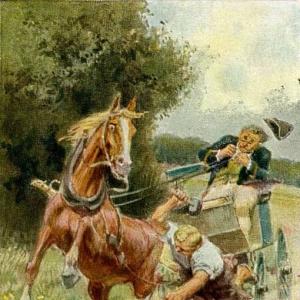Reading time: 8 min
There was once a forester who went into the forest to hunt, and as he entered it he heard a sound of screaming as if a little child were there. He followed the sound, and at last came to a high tree, and at the top of this a little child was sitting, for the mother had fallen asleep under the tree with the child, and a bird of prey had seen it in her arms, had flown down, snatched it away, and set it on the high tree.
The forester climbed up, brought the child down, and thought to himself, „Thou wilt take him home with thee, and bring him up with thy Lina.“ He took it home, therefore, and the two children grew up together. The one, however, which he had found on a tree was called Fundevogel, because a bird had carried it away. Fundevogel and Lina loved each other so dearly that when they did not see each other they were sad.
The forester, however, had an old cook, who one evening took two pails and began to fetch water, and did not go once only, but many times, out to the spring. Lina saw this and said, „Hark you, old Sanna, why are you fetching so much water?“ – „If thou wilt never repeat it to anyone, I will tell thee why.“ So Lina said, no, she would never repeat it to anyone, and then the cook said, „Early to-morrow morning, when the forester is out hunting, I will heat the water, and when it is boiling in the kettle, I will throw in Fundevogel, and will boil him in it.“
Betimes next morning the forester got up and went out hunting, and when he was gone the children were still in bed. Then Lina said to Fundevogel, „If thou wilt never leave me, I too will never leave thee.“ Fundevogel said, „Neither now, nor ever will I leave thee.“ Then said Lina, „Then I will tell thee. Last night, old Sanna carried so many buckets of water into the house that I asked her why she was doing that, and she said that if I would promise not to tell any one she would tell me, and I said I would be sure not to tell any one, and she said that early to-morrow morning when father was out hunting, she would set the kettle full of water, throw thee into it and boil thee; but we will get up quickly, dress ourselves, and go away together.“
The two children therefore got up, dressed themselves quickly, and went away. When the water in the kettle was boiling, the cook went into the bed-room to fetch Fundevogel and throw him into it. But when she came in, and went to the beds, both the children were gone. Then she was terribly alarmed, and she said to herself, „What shall I say now when the forester comes home and sees that the children are gone? They must be followed instantly to get them back again.“
Then the cook sent three servants after them, who were to run and overtake the children. The children, however, were sitting outside the forest, and when they saw from afar the three servants running, Lina said to Fundevogel, „Never leave me, and I will never leave thee.“ Fundevogel said, „Neither now, nor ever.“ Then said Lina, „Do thou become a rose-tree, and I the rose upon it.“ When the three servants came to the forest, nothing was there but a rose-tree and one rose on it, but the children were nowhere.
Then said they, „There is nothing to be done here,“ and they went home and told the cook that they had seen nothing in the forest but a little rose-bush with one rose on it. Then the old cook scolded and said, „You simpletons, you should have cut the rose-bush in two, and have broken off the rose and brought it home with you; go, and do it once.“ They had therefore to go out and look for the second time. The children, however, saw them coming from a distance. Then Lina said, „Fundevogel, never leave me, and I will never leave thee.“
Fundevogel said, „Neither now, nor ever.“ Said Lina, „Then do thou become a church, and I’ll be the chandelier in it.“ So when the three servants came, nothing was there but a church, with a chandelier in it. They said therefore to each other, „What can we do here, let us go home.“ When they got home, the cook asked if they had not found them. So they said no, they had found nothing but a church, and that there was a chandelier in it. And the cook scolded them and said, „You fools! why did you not pull the church to pieces, and bring the chandelier home with you?“
And now the old cook herself got on her legs, and went with the three servants in pursuit of the children. The children, however, saw from afar that the three servants were coming, and the cook waddling after them. Then said Lina, „Fundevogel, never leave me, and I will never leave thee.“ Then said Fundevogel, „Neither now, nor ever.“ Said Lina, „Be a fishpond, and I will be the duck upon it.“ The cook, however, came up to them, and when she saw the pond she lay down by it, and was about to drink it up. But the duck swam quickly to her, seized her head in its beak and drew her into the water, and there the old witch had to drown. Then the children went home together, and were heartily delighted, and if they are not dead, they are living still.
 Learn languages. Double-tap on a word.Learn languages in context with Childstories.org and Deepl.com.
Learn languages. Double-tap on a word.Learn languages in context with Childstories.org and Deepl.com.Backgrounds
Interpretations
Adaptions
Summary
Abstract
Linguistics
„Foundling Bird“ (German: Fundevogel) is another fairy tale collected by the Brothers Grimm in their compilation „Grimms‘ Fairy Tales“ (Kinder- und Hausmärchen). The story appears as tale number 51 in their collection. Like many other fairy tales, „Foundling Bird“ is derived from the European oral tradition and reflects the values and beliefs of the society at the time it was recorded.
The story revolves around a child named Fundevogel (or Foundling Bird), who is discovered by a forester in the woods, lying next to a bird. The forester decides to take the child home and raises him alongside his own daughter, Lina. The two children form a deep bond, becoming as close as siblings. One day, a cook decides to kidnap Fundevogel and cook him, but Lina overhears the plan and helps Fundevogel escape. Lina and Fundevogel use their wits and the power of transformation to evade the cook’s pursuit. They take on various forms, such as a rosebush and a rose, a church and a chandelier, and finally, a pond and a duck. Eventually, the cook gives up the chase, and the children return home safely.
„Foundling Bird“ is an example of a „shape-shifting“ or „transformation chase“ fairy tale, a common theme in folklore where characters take on different forms to escape danger or outwit their adversaries. The story highlights the importance of friendship, loyalty, and resourcefulness, as the two children work together to overcome obstacles and evade their pursuer. As with many other tales collected by the Brothers Grimm, „Foundling Bird“ reflects the cultural and historical context of its time. The tale conveys moral lessons, such as the value of loyalty, cooperation, and the power of love and friendship to overcome adversity.
The Brothers Grimm, Jacob and Wilhelm, were German academics, linguists, and authors who collected and published folk tales as part of their efforts to preserve German cultural heritage. The tale of „Foundling Bird“ is classified as Aarne-Thompson-Uther Tale Type 313A, „The Girl Helps the Hero Flee,“ which features a heroine helping her companion to escape from danger or an evil character. This tale type often involves the use of magical transformations as a means of eluding their pursuers. As with many of the Brothers Grimm’s fairy tales, „Foundling Bird“ has been adapted and retold in various forms over the years, including children’s books, plays, and films. The story continues to resonate with audiences due to its themes of loyalty, friendship, love, and the triumph of good over evil.
Overall, „Foundling Bird“ serves as a timeless reminder of the importance of these virtues and the resilience of the human spirit, while providing a fascinating glimpse into the world of European folklore and the oral tradition from which it emerged.
„Foundling Bird“ (Fundevogel) offers various themes and insights that can be interpreted in different ways. While interpretations may vary among readers, some common interpretations of „Foundling Bird“ include.
Resourcefulness and cleverness: Lina and Fundevogel repeatedly outwit their pursuer by transforming into different objects or creatures. This showcases their quick thinking and resourcefulness, which are key to their survival. This interpretation emphasizes the value of using one’s wits and creativity to navigate through difficult situations.
Loyalty and Friendship: One of the central themes in „Foundling Bird“ is the strong bond between Lina and Fundevogel. Their unwavering friendship and loyalty to each other enable them to overcome challenges and evade danger. This interpretation highlights the importance of having strong relationships and standing by the ones we love in times of adversity. The strong bond between Lina and Fundevogel is at the heart of the story. Their vow to never leave each other exemplifies the importance of loyalty and friendship in overcoming obstacles and adversity. Their unwavering support for each other is the key to their survival. Lina and Fundevogel are successful in escaping danger because they work together, combining their skills and efforts. This interpretation highlights the importance of collaboration and unity, emphasizing that working together can make us stronger and more capable of overcoming obstacles.
The Power of Love: Lina and Fundevogel’s love for each other is not only a source of emotional support but also gives them the ability to transform themselves in order to escape danger. Love’s transformative power is a recurring theme in fairy tales, and in this story, it allows the children to outsmart their enemies and ultimately survive. The deep bond between Lina and Fundevogel is not only demonstrated through their loyalty but also through their ability to transform together. The love between them allows them to face challenges and transform in ways that help them escape danger. This interpretation underlines the power of love to bring about positive change and resilience in the face of adversity.
The Triumph of Good Over Evil: The children, representing innocence and goodness, are pitted against the evil cook, who intends to harm them. Throughout the story, the children’s resourcefulness and determination help them overcome the cook’s wickedness. In the end, good triumphs over evil, as the cook meets her demise and the children return safely home. The tale presents a clear contrast between good (Lina and Fundevogel) and evil (the cook). The cook’s ill intentions are ultimately foiled by the children’s resourcefulness and determination, which can be seen as a triumph of good over evil. This interpretation underscores the common theme in fairy tales of the victory of virtue and righteousness.
The Importance of Wit and Ingenuity: Lina and Fundevogel demonstrate their cleverness by transforming into various objects to evade capture. This ability to think quickly and adapt to situations highlights the importance of wit and ingenuity in overcoming challenges, a common theme in many fairy tales.
The Protective Role of the Parent Figure: The forester, who saves Fundevogel and raises him alongside Lina, represents the protective and nurturing role of a parent. Although he is absent during the main events of the story, his initial act of kindness sets the stage for the bond between Lina and Fundevogel, which ultimately saves them from the evil cook.
These interpretations of „Foundling Bird“ illustrate the richness and depth of the story, revealing various themes and lessons that continue to resonate with readers today. Ultimately, the fairy tale serves as a source of reflection and discussion, allowing readers to explore the importance of friendship, loyalty, resourcefulness, and love in the face of adversity.
„Foundling Bird“ (also known as „Fundevogel“ or „Foundling“) is a German fairy tale collected by the Brothers Grimm in their famous book „Grimm’s Fairy Tales“ (originally titled „Kinder- und Hausmärchen“), first published in 1812. While „Foundling Bird“ (Fundevogel) may not be as widely adapted as some of the other Grimms‘ fairy tales, there have been a few adaptations of this classic story in various forms, including animated series, literature, and audio recordings. Some examples of adaptations of „Foundling Bird“ include.
Television: „Grimm’s Fairy Tale Classics“ (1987-1988) The animated television series „Grimm’s Fairy Tale Classics“ (also known as „Grimm Masterpiece Theater“) included an adaptation of „Foundling Bird“ in one of its episodes. This adaptation remains true to the original tale, showcasing the strong bond between Lina and Fundevogel and their clever use of transformations to escape danger. „The Bird Fancier“ episode of the TV series „The Storyteller“: This episode from Jim Henson’s „The Storyteller“ series adapts „Foundling Bird“ into a puppet show. It follows the basic plot of the original fairy tale while incorporating the unique visual style and whimsical humor of the series.
Literature: „Grimm’s Household Tales“ by Lucy Crane (1882) Lucy Crane’s English translation of „Grimm’s Household Tales“ includes a version of „Foundling Bird“ (referred to as „Foundling“). This translation features illustrations by Walter Crane, making the story more accessible and visually appealing to young readers. „The Bird Fancier’s Daughter“ by John Crowley: This novella is a modern retelling of „Foundling Bird“ set in contemporary America. It explores themes of music, love, and transformation through the story of a young woman who discovers a mysterious bird in her backyard and forms a deep connection with it. „The Foundling Bird“ by Melissa Mia Hall: This young adult novel retells the story of „Foundling Bird“ from the perspective of the princess. It explores the themes of love, identity, and social class, while also introducing new characters and plot twists.
Audio Recording: „Grimm’s Fairy Tales“ by LibriVox. LibriVox, a volunteer-driven initiative that creates free audiobook recordings of public domain literature, has an audio version of „Foundling Bird“ as part of its „Grimm’s Fairy Tales“ collection. This audio adaptation allows listeners to enjoy the story in a different format and makes it accessible to people with visual impairments or those who prefer listening to stories.
Story Collections: „The Complete Grimm’s Fairy Tales“ by Pantheon Books (1972) This comprehensive collection of Grimm’s Fairy Tales includes „Foundling Bird“ among its many stories. The book features an introduction by Padraic Colum and illustrations by Josef Scharl, providing readers with an engaging and visually appealing experience of the classic tale.
The fairy tale „Foundling Bird“ from Brothers Grimm has inspired several adaptations and retellings over the years, in various media such as literature, film, and theater. Although „Foundling Bird“ has not been as extensively adapted as some other fairy tales from the Brothers Grimm, the story’s themes of friendship, loyalty, and resourcefulness continue to resonate with audiences today. These adaptations provide opportunities for readers and viewers to engage with the story in various formats, allowing the timeless lessons of „Foundling Bird“ to be passed down to future generations.
„Foundling Bird“ (Fundevogel) is a fairy tale collected by the Brothers Grimm that tells the story of a close friendship between two children, Lina and Fundevogel, and their clever escape from danger. The tale begins with a forester finding a baby boy in the woods, lying next to a bird. The forester takes the child home and raises him alongside his own daughter, Lina. The two children grow up together, forming a strong bond and becoming as close as siblings.
One day, a cook in the forester’s household decides to kidnap Fundevogel and cook him. Lina overhears the cook’s plan and warns Fundevogel. They decide to run away together, using their wits and the power of transformation to avoid being caught. As the cook pursues them, Lina and Fundevogel transform into various objects and creatures to evade capture. First, they turn into a rosebush and a rose; then, a church and a chandelier; and finally, a pond and a duck. Each time, the cook fails to recognize them and is unable to capture them.
After several failed attempts, the cook gives up and returns home. Lina and Fundevogel safely make their way back to the forester’s house, where they continue to live happily together. „Foundling Bird“ is a tale that highlights the importance of friendship, loyalty, and resourcefulness, as Lina and Fundevogel use their strong bond and clever thinking to overcome adversity and protect each other from harm.
„Foundling Bird“ is a fairy tale by Brothers Grimm about a forester who finds a child, Fundevogel, in a tree after a bird of prey had snatched it from its sleeping mother. The forester takes Fundevogel home and raises him alongside his daughter Lina. The two children grow very close and make a vow never to leave each other.
One day, the forester’s old cook, Sanna, plans to boil Fundevogel alive when the forester is out hunting. Lina overhears this and warns Fundevogel, and the two children run away together. When the cook finds out the children have fled, she sends three servants to find them. Each time the servants approach, Lina and Fundevogel transform themselves into different objects to hide: first a rose-tree and a rose, then a church and a chandelier, and finally a fishpond and a duck.
When the servants fail to capture the children, the cook herself joins the search. As she tries to drink the water from the fishpond, the duck (Lina) drags her into the water, and the cook drowns. Lina and Fundevogel return home safely, happy to be together, and continue living their lives, presumably till the end of their days.
The Brothers Grimm tale „Foundling Bird“ (or „Fundevogel“) presents a captivating narrative that provides ample material for linguistic analysis. This analysis will focus on several aspects, including structure, stylistic elements, characterization through dialogue, and thematic language.
Structure and Form:
„Foundling Bird“ is a traditional fairy tale and follows a classic narrative structure with a clear progression: introduction, complication, climax, and resolution. The story opens with a forester finding a lost child, establishing the foundational relationship between Fundevogel and Lina. The complication arises with the cook’s sinister plan, leading to the children’s escape and transformation sequence, which constitutes the climax. The resolution unfolds with the defeat of the villain and the children’s safe return.
Stylistic Elements
*Repetition:*
Repetition is a hallmark of oral storytelling and pervades this tale. The phrase „never leave me, and I will never leave thee“ recurs throughout the narrative, reinforcing the theme of loyalty and unity between Fundevogel and Lina.
*Transformation:*
The metamorphosis in which the children transform into various objects to evade capture is a folkloric motif. This not only advances the plot but also emphasizes the magical realism typical in fairy tales.
Characterization through Dialogue:
Dialogue serves as a primary tool for character development and plot advancement in the tale. Lina’s dialogues reveal her proactive nature and quick thinking. Her repeated assurances to Fundevogel reflect her loyalty and protective instincts. Fundevogel’s responses mirror his trust and unwavering bond with Lina, aligning with the tale’s theme of inseparable companionship.
Thematic Language
*Innocence and Evil:*
The language juxtaposes the innocence of the children with the malevolence of the cook. The forester, a protector figure, contrasts with the cook, who represents betrayal and danger within a domestic space.
*Nature and Transformation:*
The descriptive transformations (rose-tree, church, pond) illustrate a deep connection with nature and highlight themes of adaptability and resourcefulness.
Symbolism
*The Bird and Tree:*
The initial image of the bird snatching the child and placing it atop a tree symbolizes vulnerability and displacement, a common theme in fairy tales related to identity and belonging.
Conclusion:
„Foundling Bird“ is rich with linguistic and thematic elements typical of the Brothers Grimm fairy tales. Its use of repetition, transformation, and dialogue effectively conveys its narrative and themes of loyalty, innocence, and the triumph of good over evil. The simple yet profound language serves to captivate and convey moral lessons, maintaining the oral tradition from which it originated.
Information for scientific analysis
Fairy tale statistics | Value |
|---|---|
| Number | KHM 51 |
| Aarne-Thompson-Uther-Index | ATU Typ 313 |
| Translations | DE, EN, DA, ES, FR, PT, FI, HU, IT, JA, NL, PL, RU, TR, VI, ZH |
| Readability Index by Björnsson | 32.8 |
| Flesch-Reading-Ease Index | 78.6 |
| Flesch–Kincaid Grade-Level | 7.5 |
| Gunning Fog Index | 9.6 |
| Coleman–Liau Index | 7.6 |
| SMOG Index | 8.5 |
| Automated Readability Index | 7.8 |
| Character Count | 5.029 |
| Letter Count | 3.829 |
| Sentence Count | 46 |
| Word Count | 963 |
| Average Words per Sentence | 20,93 |
| Words with more than 6 letters | 114 |
| Percentage of long words | 11.8% |
| Number of Syllables | 1.218 |
| Average Syllables per Word | 1,26 |
| Words with three Syllables | 38 |
| Percentage Words with three Syllables | 3.9% |

 Facebook
Facebook  Whatsapp
Whatsapp  Messenger
Messenger  Telegram
Telegram Reddit
Reddit















